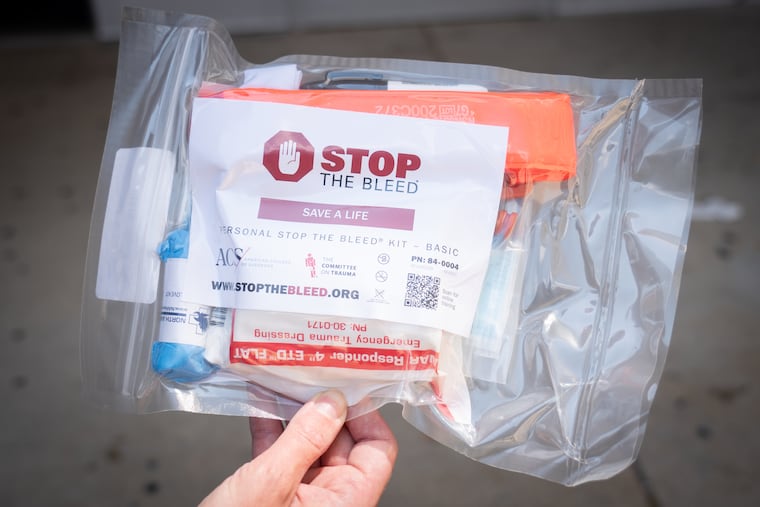New Jersey is giving out thousands of ‘bleeding control kits’ to houses of worship
The move is precautionary, a NJOHSP spokesperson stressed, noting that “there are currently no known, credible or specific threats to New Jersey at this time.”

New Jersey is equipping more than 6,400 churches, mosques, synagogues, and other houses of worship across the state with “bleeding control kits” — part of a precautionary initiative to prepare its faithful in the event of a shooting, stabbing, or other attack, officials said.
The New Jersey Office of Homeland Security and Preparedness said this month that it will provide approximately 7,100 kits — each of which includes a tourniquet, a pressure bandage, gauze, chest seals, gloves, and shears — and training to its places of prayer.
The move is precautionary, stressed NJOHSP spokesperson Maria Prato, noting that “there are currently no known, credible or specific threats to New Jersey at this time.”
However, Prato pointed to several religiously motivated incidents in New Jersey in recent years, including the 2019 fatal shooting at a Jersey City kosher market that left six people dead: three civilians, a police officer and two suspects. Officials said the premeditated attack on the Jewish grocer was “fueled by both antisemitism and anti-law enforcement beliefs.” Prato also highlighted the attempted firebombing of a Bloomfield synagogue last year, a smoke bomb and bear spray attack on concertgoers at a church’s antiracism concert in Asbury Park in August, and vandalism and bias incidents against several Catholic churches in Camden and Gloucester Counties.
In Pennsylvania in 2018, 11 worshipers were killed by a gunman spewing antisemitic hatred at Pittsburgh’s Tree of Life Synagogue, the deadliest attack on Jewish people in U.S. history.
The first month of the Israel-Hamas war also saw increased reports of harassment and violence targeting Jewish, Muslim, and Arab residents nationwide.
“We cannot afford to wait for a cataclysmic incident at a house of worship,” Prato said, adding the office’s strategy in providing bleeding control resources and education is “proactive, not reactive.”
“Our hope is that no one ever has to use these kits,” said NJOHSP director Laurie Doran.
“A victim, depending on the wound’s location and severity, may have five to eight minutes to slow blood loss,” Doran said. “While many religious organizations have become more vigilant with mitigating risks and threat levels, the quick action of bystanders can drastically improve the survivability of the wounded as they wait for [a] first responder’s arrival.”
Houses of worship are considered “soft targets,” Prato said, due to easy access and often limited security. They’re also a hub for mass gatherings, which can attract bad actors, she said.
In December, the Department of Homeland Security released a guide for faith groups to better protect themselves against threats at a time of heightened tensions across religious communities, including tips such as installing motion-sensitive lighting, keeping landscaping trimmed to prevent creating hiding places for attackers, and training greeters to identify early warning signs of potential violence.
New Jersey plans to distribute the bleeding control kits to its houses of worship within the year — including more than 1,200 locations in South Jersey, Prato said. The kits, NJOHSP said in a statement, will “help prevent deaths among victims with traumatic injuries received during an active shooter or hostile event incident, prior to the arrival of first responders.”
Law enforcement and medical professionals will help deliver trainings to congregations, Prato said.
The initiative, funded by a grant from the Federal Emergency Management Agency, is part of the national “Stop the Bleed” campaign from the American College of Surgeons, which offers courses to communities on how to control traumatic bleeding. The kits cost $56 a piece, Prato said, “a very small price to pay if we have a chance at sparing even a single life.”
» READ MORE: ‘Stop the Bleed’ courses are helping Philadelphians buy valuable time
“Stop the Bleed” kits and training have been distributed at Philadelphia day camps, grocery stores, Lincoln Financial Field, and at schools, libraries and health centers across the country. In 2020, the New Jersey Department of Education was awarded funding to provide bleeding control kits and training to the state’s public school districts.
New Jersey houses of worship interested in obtaining a “Stop the Bleed” kit, Prato said, should visit: Bit.ly/njohspbleedkits.